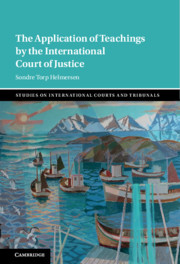Book contents
- The Application of Teachings by the International Court of Justice
- Studies on International Courts and Tribunals
- The Application of Teachings by the International Court of Justice
- Copyright page
- Contents
- Figures
- Tables
- Foreword
- Preface
- Table of Cases
- Table of Treaties
- Abbreviations
- 1 Introduction
- 2 The ICJ Statute Article 38(1)
- 3 The General Role of Teachings in the ICJ
- 4 Variations between Works
- 5 Variations between Judges
- 6 Concluding Reflections
- Book part
- Bibliography
- Index
4 - Variations between Works
Published online by Cambridge University Press: 04 March 2021
- The Application of Teachings by the International Court of Justice
- Studies on International Courts and Tribunals
- The Application of Teachings by the International Court of Justice
- Copyright page
- Contents
- Figures
- Tables
- Foreword
- Preface
- Table of Cases
- Table of Treaties
- Abbreviations
- 1 Introduction
- 2 The ICJ Statute Article 38(1)
- 3 The General Role of Teachings in the ICJ
- 4 Variations between Works
- 5 Variations between Judges
- 6 Concluding Reflections
- Book part
- Bibliography
- Index
Summary
This chapter argues that the weight of teachings in the ICJ varies between works. Some works are cited far more than others. The most-cited writers tend to men from Western countries. The judges frequently justify citations of teachings, by arguing that the teachings of high quality, that the writer is an expert, that the writer holds an official position, or that multiple writers agree. It is plausible to view this as factors that influence the weight of teachings. Explanations for why the judges distinguish between works is that they want to make their opinions authoritative, that they want to save time, and that they want to comply with the ICJ Statute Article 38(1). Finally it is argued that the variations between the weight of teachings shows that authority in international law is established through an informal, collective process.
- Type
- Chapter
- Information
- Publisher: Cambridge University PressPrint publication year: 2021

